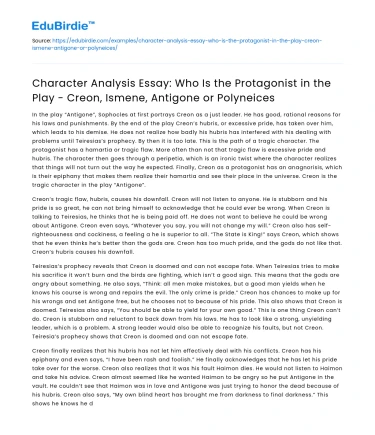In the play “Antigone”, Sophocles at first portrays Creon as a just leader. He has good, rational reasons for his laws and punishments. By the end of the play Creon’s hubris, or excessive pride, has taken over him, which leads to his demise. He does not realize how badly his hubris has interfered with his dealing with problems until Teiresias’s prophecy. By then it is too late. This is the path of a tragic character. The protagonist has a hamartia or tragic flaw. More often than not that tragic flaw is excessive pride and hubris. The character then goes through a peripetia, which is an ironic twist where the character realizes that things will not turn out the way he expected. Finally, Creon as a protagonist has an anagnorisis, which is their epiphany that makes them realize their hamartia and see their place in the universe. Creon is the tragic character in the play “Antigone”.
Creon’s tragic flaw, hubris, causes his downfall. Creon will not listen to anyone. He is stubborn and his pride is so great, he can not bring himself to acknowledge that he could ever be wrong. When Creon is talking to Teiresias, he thinks that he is being paid off. He does not want to believe he could be wrong about Antigone. Creon even says, “Whatever you say, you will not change my will.” Creon also has self-righteousness and cockiness, a feeling a he is superior to all. “The State is King!” says Creon, which shows that he even thinks he’s better than the gods are. Creon has too much pride, and the gods do not like that. Creon’s hubris causes his downfall.
Save your time!
We can take care of your essay
- Proper editing and formatting
- Free revision, title page, and bibliography
- Flexible prices and money-back guarantee
Teiresias’s prophecy reveals that Creon is doomed and can not escape fate. When Teiresias tries to make his sacrifice it won’t burn and the birds are fighting, which isn’t a good sign. This means that the gods are angry about something. He also says, “Think: all men make mistakes, but a good man yields when he knows his course is wrong and repairs the evil. The only crime is pride.” Creon has chances to make up for his wrongs and set Antigone free, but he chooses not to because of his pride. This also shows that Creon is doomed. Teiresias also says, “You should be able to yield for your own good.” This is one thing Creon can’t do. Creon is stubborn and reluctant to back down from his laws. He has to look like a strong, unyielding leader, which is a problem. A strong leader would also be able to recognize his faults, but not Creon. Teiresia’s prophecy shows that Creon is doomed and can not escape fate.
Creon finally realizes that his hubris has not let him effectively deal with his conflicts. Creon has his epiphany and even says, “I have been rash and foolish.” He finally acknowledges that he has let his pride take over for the worse. Creon also realizes that it was his fault Haimon dies. He would not listen to Haimon and take his advice. Creon almost seemed like he wanted Haimon to be angry so he put Antigone in the vault. He couldn’t see that Haimon was in love and Antigone was just trying to honor the dead because of his hubris. Creon also says, “My own blind heart has brought me from darkness to final darkness.” This shows he knows he didn’t use his brain to solve his problems. He was already heading in the wrong direction with his pride and it finally was too much. Creon’s hubris has not let him effectively deal with his conflicts.
Creon goes through all the phases of a tragic character. His hubris doesn’t effectively let him deal with his problems. Teiresias’s prophecy is the peripetia and Creon finds out things won’t go the way he planned. Finally, Creon has his anagnorisis and realizes that his hubris has brought his downfall. Creon is truly the tragic character in “Antigone”.






 Stuck on your essay?
Stuck on your essay?

